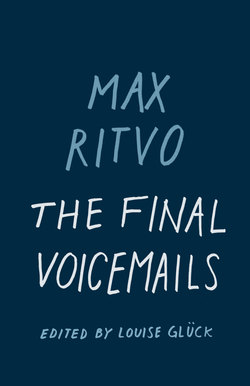Описание книги
“Even present tense has some of the grace of past tense, / what with all the present tense left to go.” From Max Ritvo—selected and edited by Louise Glück—comes a final collection of poems fully inscribed with the daring of his acrobatic mind and the force of his unrelenting spirit.<br><br>
Diagnosed with terminal cancer at sixteen, Ritvo spent the next decade of his life writing with frenetic energy, culminating in the publication of <i>Four Reincarnations</i>. As with his debut, <i>The Final Voicemails</i> brushes up against the pain, fear, and isolation that accompany a long illness, but with all the creative force of an artist in full command of his craft and the teeming affection of a human utterly in love with the world.<br><br>
The representation of the end of life resists simplicity here. It is physical decay, but it is also tedium. It is alchemy, “the breaking apart, / the replacement of who, when, how, and where, / with what.” It is an antagonist—and it is a part of the self. Ritvo’s poems ring with considered reflection on the enduring final question, while suggesting—in their vibrancy and their humor—that death is not merely an end.<br><br>
<i>The Final Voicemails</i> is an ecstatic, hopeful, painful—and completely breathtaking—second collection.
Diagnosed with terminal cancer at sixteen, Ritvo spent the next decade of his life writing with frenetic energy, culminating in the publication of <i>Four Reincarnations</i>. As with his debut, <i>The Final Voicemails</i> brushes up against the pain, fear, and isolation that accompany a long illness, but with all the creative force of an artist in full command of his craft and the teeming affection of a human utterly in love with the world.<br><br>
The representation of the end of life resists simplicity here. It is physical decay, but it is also tedium. It is alchemy, “the breaking apart, / the replacement of who, when, how, and where, / with what.” It is an antagonist—and it is a part of the self. Ritvo’s poems ring with considered reflection on the enduring final question, while suggesting—in their vibrancy and their humor—that death is not merely an end.<br><br>
<i>The Final Voicemails</i> is an ecstatic, hopeful, painful—and completely breathtaking—second collection.
